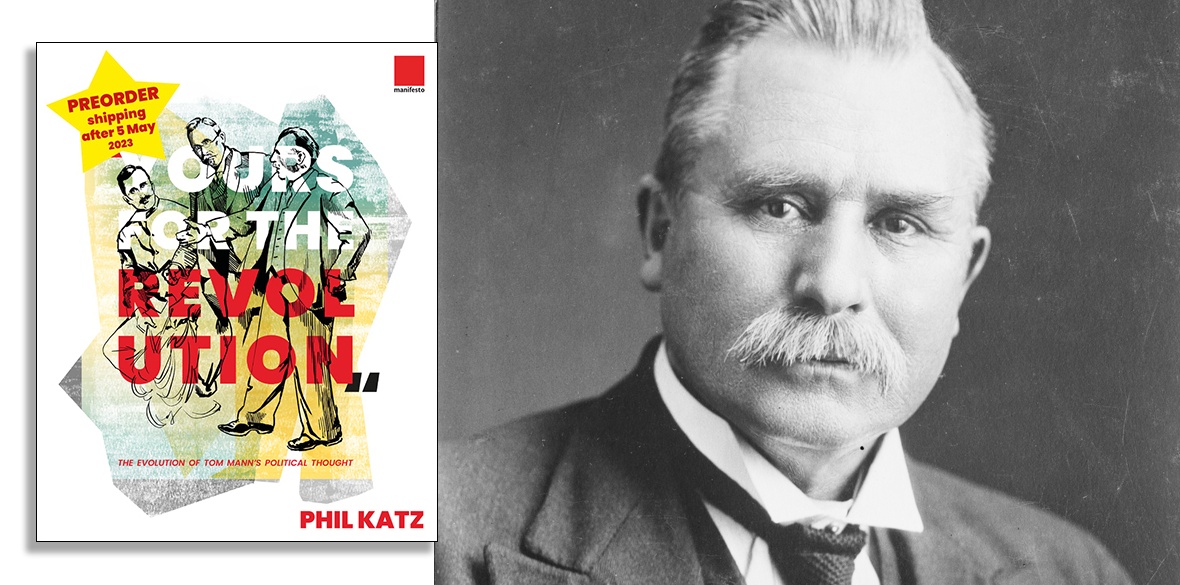This is the last article you can read this month
You can read more article this month
You can read more articles this month
Sorry your limit is up for this month
Reset on:
Please help support the Morning Star by subscribing here
Yours for the Revolution — the evolution of Tom Mann’s political thought
PHIL KATZ, Manifesto Press, £20.00
“WHAT drove Mann? A belief in revolution.”
Phil Katz’s biography of Tom Mann is most assuredly an important and timely reappraisal of a great life.
But it is much more than that — due in large part to the author’s own longevity as an activist. It is both a clarion call to, and a handbook for, today’s socialists and communists to further stiffen their resolve and intensify the class struggle as it presents itself to them in their specific situations, regardless of the seeming enormity of the forces arraigned against us.
In his Theses on the Problems of Marxist Criticism, Anatoli Lunacharsky states: “Everything that aids the development and victory of the proletariat is good; everything that harms it is evil.”
Lunacharsky identifies three key criteria that upon which the socialist writer should focus his or her efforts: content, form and universality.
Against each of these, Yours for the Revolution is an outstanding success.
Katz’s own personal immersion in the class struggle provides both a front-line view of Tom Mann’s battles and achievements, alongside the wider-angled analysis that comes naturally to an academic.
This telescopic adroitness, allows the author to zero in and out of the immense detail at his disposal, simultaneously avoiding even the merest hint of hagiography, while demonstrating that Mann was, indeed, a great man. ‘Pioneer’ is Katz’s preferred term.
The outline of Mann’s life is reasonably well known: born into a Coventry working-class family, he received minimal formal schooling and was exposed early to the dangers and indignities of pit-work. But Mann was an incredible autodidact and union organiser, a member of the Marxist Social Democratic Federation who fought for an eight-hour day, and rose to be one of the principal architects of new unionism, a key leader in the Great Dock Strike of 1889 and an outspoken member of the Royal Commission on labour.
A committed internationalist, Mann travelled extensively in the years before 1914, including to Ireland, South Africa and the US, agitating fearlessly in support of organised working-class movements. After an initial period of equivocation, he opposed the imperialist war that followed.
It is at this point that most accounts tail off, as if the next two-and-a-half decades of Mann’s life were of little impact or relevance. Yet Katz successfully demonstrates that Mann, by now a member of the Communist Party, remained adamantine and active in the fight against unemployment and an early advocate for leftist unity in the face of the rising fascist threat, wherever it was to be found.
Katz is unapologetic in accounting for the centrality of the Christian message in Mann’s life and there are some wonderful accounts of his speeches both at home and abroad that testify to the way he eschewed the simplistic antagonism between communism and a personal faith, such as this one:
“There is an ever-growing power that is making men more God-like, yet ever increasing is the spread of unemployment and suffering people.”
In terms of form, whilst the book follows a traditional chronological rather than a thematic structure, Katz’s insistence that it provides practical inspiration to present-day activists sees him entirely avoiding footnotes, although there is a detailed bibliography for those wishing to pursue further reading.
Similarly, Katz’s opening chapter (Reading Yours for the Revolution) provides a welcome, contextual orientation for the general reader. Here, he carefully evaluates the achievements and limitations of previous biographers but also allows himself space to reflect on the main themes of Mann’s life in a non-dogmatic and questioning manner that invites others to continue the discussion.
But the greatest achievement of this work is its universal message, encapsulated throughout Mann’s adulthood, of being uncompromising in one’s beliefs, but collaborative in how they might be achieved and protected.
Mann developed a trilogy of decisive features for successful trade unionism, which comprise a sense of values, a sense of organisation and, most important by far, a sense of purpose.
While Mann’s early allies, such as John Burns and Ben Tillett, made their peace with the capitalist establishment, he was unwavering in the revolutionary orientation of his life. He would even sign off his letters and postcards with, ‘Yours for the revolution’ (hence the work’s title).
In this compelling account, Yours for the Revolution demonstrates that Tom Mann is an exemplar for all revolutionary lives worthy of the term.











